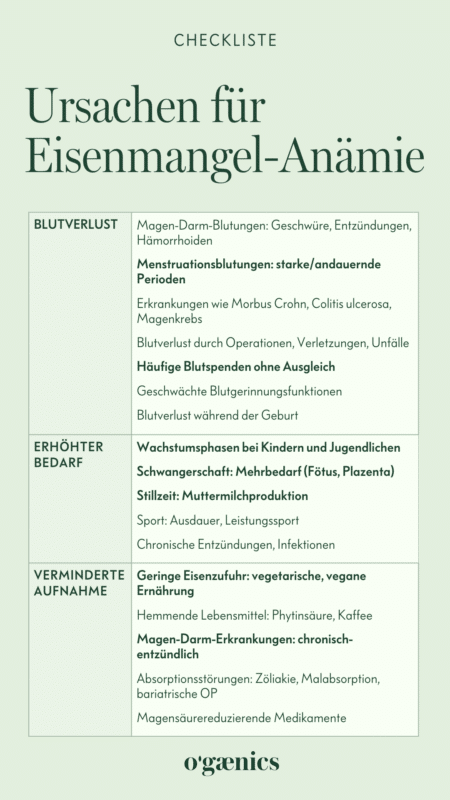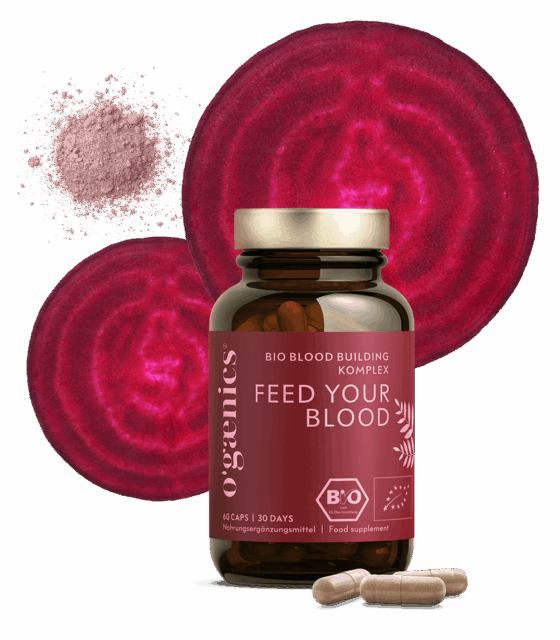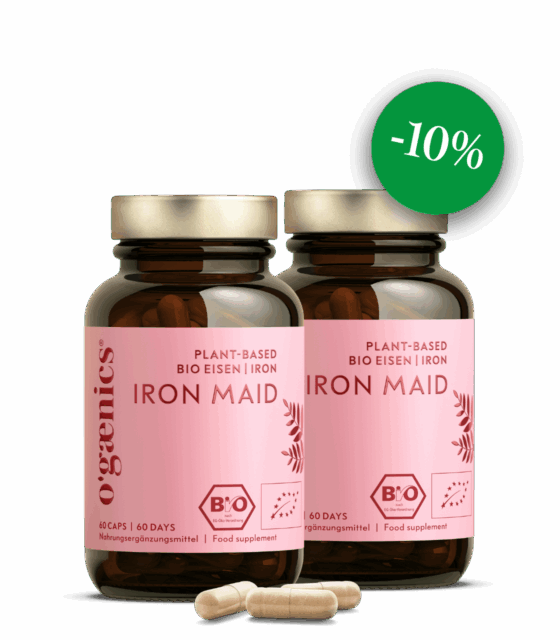Fatigue, dizziness and lack of concentration? These may be signs of anemia.
If you often feel tired and listless or suffer from dizziness and difficulty concentrating, this could indicate anemia. But what does that mean exactly and how does this anemia develop?
How does anemia make itself felt?
Anemia, also known as iron deficiency anemia, occurs when the body does not produce enough red blood cells or when the existing red blood cells do not contain enough hemoglobin. Hemoglobin is a protein that transports oxygen and is responsible for the red color of blood. Anemia can manifest in several ways, including:
- Fatigue and weakness: One of the most common symptoms of anemia is persistent fatigue and weakness, even with little exertion. Sufferers may feel exhausted and lack energy.
- Shortness of breath: Decreased oxygen supply to the body due to low red blood cell count may cause difficulty breathing and shortness of breath, especially during physical activity.
- Pale skin and mucous membranes: Anemia can cause pale skin color, especially on the face, lips and nails. Mucous membranes such as gums and conjunctiva may also appear pale.
- Dizziness and difficulty concentrating: Lack of oxygen to the brain can cause dizziness, lightheadedness when standing up, and problems with concentration and memory.
- Palpitations and rapid heartbeat: Anemia can cause the heart to beat faster to compensate for the lack of oxygen. This can cause palpitations, irregular heartbeat and increased heart rate.
- Cold hands and feet: Reduced blood flow can make hands and feet feel cool or even cold.
- Brittle nails and hair loss: Iron deficiency can also lead to brittle nails and hair loss. You can read more about this in our article“Hair loss – the nine most common causes”.
It is important to note that these symptoms are not specific to anemia and other medical conditions can cause similar symptoms. For example, tiredness can also indicate a weakened liver. Read our article 2Tired all the time? Maybe your liver is whispering for help”.
What are the possible causes of anemia?
One of the most common causes of anemia is a nutrient deficiency, the most common being iron deficiency.
Up to 70% of the iron in the body is found in the hemoglobin of red blood cells. The other 30% is stored in the form of ferritin and hemosiderin. Only about 10% of the iron ingested with food is absorbed in the small intestine and transported into the plasma.
If your iron level is too low, you could have anemia. This means you don’t have enough healthy red blood cells to carry oxygen to your organs and tissues.
This leads to iron deficiency anemia
The main causes of iron deficiency and anemia can be roughly divided into three categories: Blood loss, increased requirement and low absorption of iron.
Blood loss may be due to acute or chronic bleeding in the gastrointestinal tract, whether from ulcers, inflammation, or hemorrhoids. Menstrual bleeding in women with heavy or long periods, as well as diseases such as Crohn’s disease, ulcerative colitis or gastric cancer, can also lead to significant blood loss and subsequently to anemia.
In certain stages of life, the need for iron also increases, which leads to increased demand. During growth phases in children and adolescents, as well as during pregnancy, when the body increases the need for fetal development and placental formation, sufficient iron is essential. Iron requirements can also increase during lactation, when iron is needed for the production of breast milk, and during intense physical activity, especially for endurance or competitive athletes. If this is not covered, there is a risk of iron deficiency and eventually anemia.
Last but not least, insufficient dietary intake of iron can lead to deficiency and anemia. An unbalanced diet, as with vegetarian or vegan diets, can lead to an insufficient iron intake. Consumption of inhibitory substances such as foods rich in phytic acid or coffee during meals may also impair iron absorption. In addition, chronic inflammatory diseases of the gastrointestinal tract, absorption disorders such as those associated with celiac disease, and the use of gastric acid-reducing drugs can hinder the absorption of iron.
In addition to iron deficiency, deficiency of vitamin B12 or folate, a B vitamin, can also be causative for anemia. This is because both nutrients are involved in the formation of healthy red blood cells. A deficit or deficiency may occur due to inadequate absorption of vitamin B12 and folate from food or due to problems with absorption in the gastrointestinal tract. Pregnant women are also at increased risk for folate deficiency.
Get out of anemia with nutritional supplementation
In the case of anemia due to nutrient deficiency, you should increase your intake of these nutrients to initially compensate for the deficiency. A doctor can determine your nutrient status by blood analysis to determine the right dosage for you and make sure the treatment is effective.
A recommended and scientifically dosed product that contains all blood-building nutrients in combination is the “Feed Your Blood Bloodbuilding Complex” from Ogaenics. This organic dietary supplement contains 30 mg of plant iron in combination with natural vitamin B12 and folate, as well as natural vitamin C, which improves the absorption of iron. It effectively replenishes your nutrient stores for anemia blood formation in a purely natural way, without any side effects.
Bonus: The plant-based iron in it is particularly well tolerated and causes less gastrointestinal discomfort than conventional iron supplements. You also have no risk of overdosing because your body can usually regulate excess iron from plant sources better.
Basically, you should take iron supplements in the morning on an empty stomach and at least half an hour before or two hours after eating.
Nutrition for anemia
To prevent or treat anemia, a balanced diet is important. You should pay attention to more iron-rich foods as well as a vitamin B12-rich and folate-rich diet, improve bioavailability through clever combinations, and avoid hindering foods.
Foods containing iron
- Red meat (preferably lean meat such as beef or poultry)
- Fish (especially seafood such as oysters and mussels)
- Legumes (beans, lentils, chickpeas)
- Green leafy vegetables (spinach, kale)
- Enriched cereal products (e.g. oatmeal, wholemeal bread)
- Nuts and seeds (e.g. pumpkin seeds, sunflower seeds)
Food containing vitamin B12
- Meat (especially liver)
- Fish
- Eggs
- Dairy products
Folate-containing foods
- Green leafy vegetables (like spinach and kale)
- Legumes
- Avocado
- Oranges
- Broccoli.
Increase the usability of the absorbed iron
The usability of dietary plant iron can be improved by some strategies. Plant iron, also known as non-heme iron, is generally absorbed somewhat less efficiently by the body than heme iron, which is found in animal sources. Here are some ways to increase the usability of plant iron:
To optimize the absorption of iron from plant sources, it is important to prepare the foods properly and combine them skillfully.
- Soaking legumes and grain products before cooking can reduce phytic acid content and increase iron bioavailability. Germination of seeds, grains or legumes can have similar effects.
- Some foods and beverages can inhibit the absorption of plant iron. These include tea, coffee, dairy products, and foods high in phytic acid (e.g., whole grains). Try to keep these inhibitors away from meals to increase iron absorption.
- Vitamin C increases the absorption of plant iron in the intestine. You can eat foods rich in vitamin C along with iron-rich plant sources. For example, you could combine spinach or legumes with citrus fruits, peppers or broccoli, or drink a glass of orange juice with them.
-
Set 2x Iron Maid | Plant-Based Organic Iron
Pack of 2 (=4-month supply) organic iron from premium organic curry leaf extract with active partner vitamin C from organic amla extract98,80 €109,80 €1.389,87 €1.250,63 € / kg
Conclusion
So, in summary, identifying the specific cause of anemia is the key to effective treatment. If there are signs of iron deficiency or other nutrient deficiencies for anemia, you should specifically eliminate these deficiencies. This includes a conscious diet high in blood-forming nutrients such as iron, folate and vitamin B12. The natural supplement Feed Your Blood Bloodbuilding Complex by Ogaenics is specifically designed to meet these nutritional needs and can effectively support you.










 No products in the cart.
No products in the cart.